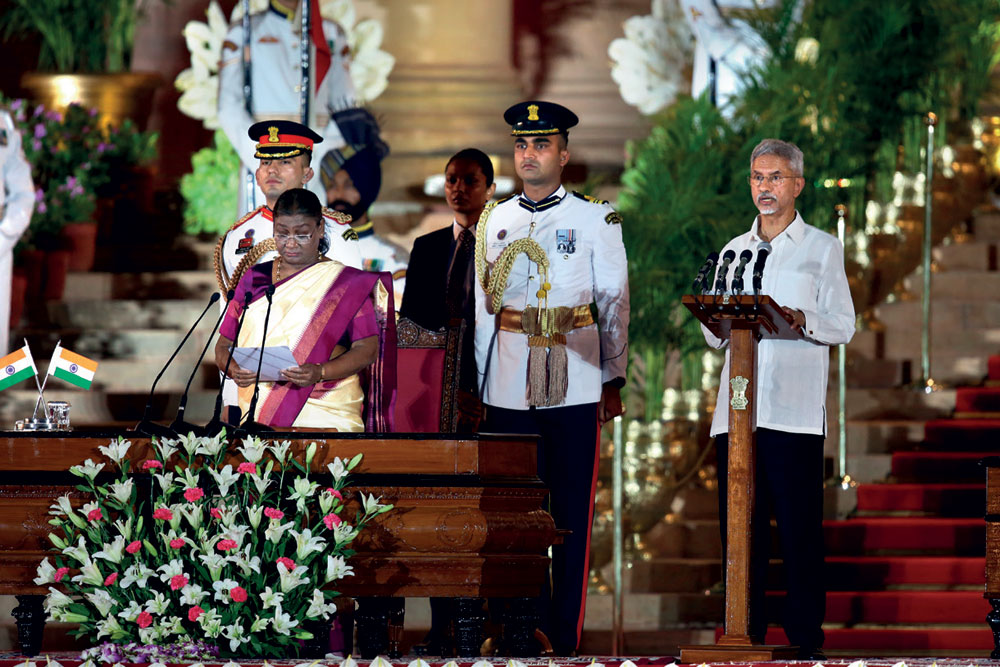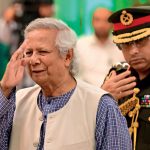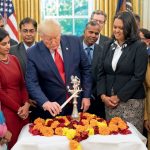A Guarantee Of Continuity
Modi’s re-election assures India’s allies that Delhi will play a leading role in shaping the new world order
 Harsh V Pant
Harsh V Pant
 Harsh V Pant
|
21 Jun, 2024
Harsh V Pant
|
21 Jun, 2024
/wp-content/uploads/2024/06/GuaranteeContinuity1.jpg)
(Illustration: Saurabh Singh)
AS THE LEADERS of G7 met in Italy last week, most of them were facing daunting domestic political challenges at home. US President Joe Biden is being challenged by Donald Trump and a tough political battle lies ahead. French President Emmanuel Macron had to call snap elections after voters in France dealt his party a humiliating blow in the European parliamentary elections. German Chancellor Olaf Scholz decided not to take any risk though he too performed poorly. Rishi Sunak and his Conservative Party are assured of a rout in next month’s British general election if their current polling numbers are anything to go by. Canadian Prime Minister Justin Trudeau has been trailing in polls by double digits for nearly a year now although he seems to be in no hurry to give up his post despite intraparty rumblings.
Contrast this with Prime Minister Narendra Modi who was attending his fifth consecutive G7 summit this year after winning a historic third term in office. He has given a strong sense of continuity by carrying forward most of his Cabinet members and in particular in the realm of foreign policy and national security. This means New Delhi will continue to search for its rightful place in the comity of nations as a “leading power”. With Amit Shah as the home minister responsible for internal security, S Jaishankar at the helm of the Ministry of External Affairs, Ajit Doval as National Security Advisor (NSA), the team that has negotiated the nation’s way through a highly tumultuous decade will now be shepherding India again. As much as India has reposed its faith in the leadership of Modi, the prime minister has underlined his faith in the ability of his team to deliver.
At a time when the world is grappling with a range of challenges and global leadership is struggling to respond, this continuity in the context of India is great news for the world as well. It has become a cliché to suggest that the global order is in flux. Global powers are competing much more sharply than at any time in the recent past and new powers are seeking their place under the sun. The consolidation of antagonistic power blocs is taking the world back to the heyday of the Cold War, although of a different kind.
The geopolitical shift from the unipolar moment of the early 1990s dominated by the US to a distinctly multipolar world order is paving the way for emerging powers to assert their influence on global affairs even as the older framework of treaty-based alliances is being renegotiated in favour of ad hoc issue-based coalitions of likeminded partners. This is happening at a time when the geo-economic certainties of the past are being challenged as economic globalisation gives way to inward orientation in precisely those nations which were at one time the biggest votaries of economic integration.
At the same time, the rise of digital economies, powered by advancements in technology, has transformed industries and labour markets globally, thereby increasing economic interdependence on the one hand but also raising concerns about issues like data privacy, cyber warfare, and economic inequality between and within nations. Demographic shifts, including ageing populations in some regions and youthful populations in others, are reshaping consumer markets and labour forces. Social movements advocating for human rights, environmental sustainability, and social justice are gaining momentum, influencing policies and corporate behaviour worldwide.
The onslaught of the Covid-19 pandemic ended up accelerating these underlying trends, such as the digitalisation of economies and the re-evaluation of global supply chains, while also highlighting vulnerabilities in global governance and cooperation.
Today the world is grappling with fundamental transformations brought about by shifting power balance, technological overreach, and institutional decay. The Covid pandemic and the Ukraine conflict widened these faultlines, resulting in global inflationary pressures, food and energy crises, and widespread economic fallout. States are frantically scraping their coffers to provide for their citizens’ basic needs, and we are standing farther from achieving the Sustainable Development Goals (SDGs).
Modi has ensured that New Delhi’s approach to partnerships is not a prisoner of the past. Where close partnerships were seen as part of the problem, today they are deemed as ensuring greater room for managing even contending relationships. Delhi proudly proclaims that it is non-West, not anti-West, even as it is an enthusiastic member of BRICS and the Shanghai Cooperation Organisation
At a time when they are most needed, global institutions have proven to be incapable of responding to the needs of our times. Multilateralism is failing and flailing, resulting in growing scepticism about the effectiveness of existing multilateral frameworks and calls for reform. The growing credibility crisis for multilateral institutions is paving the way for various plurilaterals, some of which India itself is part of, such as the Quad and the I2U2 (India, Israel, UAE and the US). From India’s perspective, this crisis of multilateralism is accentuated by the lack of broader representation of developing countries and emerging economies in global multilateral institutions. It has thus advocated for ‘reformed multilateralism’ to ensure that international organisations reflect the current power balances.
At a time of this widespread global turmoil, India stands out as a beacon of hope. It is the fastest growing major economy in the world today with a stable democratic political system that is attracting the world’s attention. For long, India’s seemingly chaotic domestic politics was seen as a drag on the India story. Today, it is the same institutional fabric that is producing qualitatively different outcomes. The stability engendered by Modi 3.0 will ensure that the spotlight continues to be on New Delhi with all the attendant consequences.
The consequences of China’s belligerence, and its own internal vulnerabilities, have certainly created greater space for the democratic world to underscore its primacy; the Chinese model will never be able to match the ability of democracies, despite their weaknesses, to respond to the aspirations of the millions.
At the other end of the spectrum, there is a declining power that has managed to tilt the geopolitical balance in Eurasia. Russia’s aggression against Ukraine has forced Europe to reckon with geopolitics once again. The course and the conduct of the war in Ukraine are likely to fundamentally alter European threat perception and have given NATO a new lease of life. Globally, the Russia-China axis has been cemented and global faultlines are more vivid than they have ever been.
Geopolitics is back in the driving seat as trust becomes an essential factor in shaping economic decisions. As Washington makes policy moves to deny China access to critical technologies and restructure supply chains away from overdependence on China, it recognises the need for new partnerships with likeminded states.

But with Washington pushing for supply-chain restructuring in critical industries due to foreign policy and national security concerns, this is certainly ushering in a new phase in globalisation. Forces of untrammelled economic globalisation that were once viewed as the panacea for all global problems are now under retreat. Mutual dependencies are being weaponised, further undercutting the foundations of a globalised world. And if emerging technologies are going to determine the next phase of geopolitics, then the polarisation of supply chains is the new reality that policymakers and market forces will have to contend with.
China, as a consequence, finds itself in a bind and India’s stiff resistance to its aggressive pursuit along the Line of Actual Control (LAC) has put paid to the Chinese Communist Party’s (CCP) narrative that its time has come. India’s standing up to China has ignited a process of a broad pushback across the Indo-Pacific and beyond. And with a plethora of domestic challenges being faced by Beijing, there is once again a premium on internal consolidation. India, as a consequence, finds itself in a ‘geopolitical sweet spot’ that it should make the most of. In the past, New Delhi’s inability to exploit the extant balance of power to its advantage cost it dearly. A prudent nation should be able to identify the opportunities in the existing structure of global politics and shape its external engagement accordingly in the pursuit of its interests. Pursuing unrealistic ideational constructs can often do more damage to a nation’s standing. For India today, the most serious challenge is the rise of China and how it has managed to constrain India’s options. New Delhi’s first priority in the coming years will be to internally consolidate its capabilities so that it can stand up to Beijing’s nefarious designs on a more sustained basis. This will have to be supplemented with building serious partnerships that are capable of adding value to India’s growth story.
If India today is being seen by the West as its bridge to the global South, Modi and Jaishankar’s deft diplomacy has made sure that India’s engagements with multiple stakeholders continue unabated
Modi has ensured that New Delhi’s approach to partnerships is not a prisoner of the past. Where in the past close partnerships were seen as part of the problem, constraining India’s ability to manoeuvre, today they are deemed as ensuring greater room for managing at times even contending relationships. Delhi today proudly proclaims that it is non-West, not anti-West, even as it is an enthusiastic member of BRICS and the Shanghai Cooperation Organisation (SCO). It is courted by the Russians and the Ukrainians as well as by the Israelis and the Palestinians. If India today is being seen by the West as its bridge to the Global South, Modi and Jaishankar’s deft diplomacy has made sure that India’s engagements with multiple stakeholders continue unabated. Despite the China factor, India has managed to enhance its profile in a range of global platforms, be they multilateral or plurilateral. The most high-profile plurilateral—the Quad—gained its salience precisely because of India’s serious engagement with it over the last few years.
The Modi government has succeeded in altering the very nature of India’s partnerships by making them key to enhancing the country’s strategic autonomy. Instead of close alignments being viewed as a constraint, there has been an emphasis on building robust partnerships with likeminded partners, increasing India’s strategic space to manoeuvre. For India’s partners, the continuation of the Modi government would mean a continuation of New Delhi’s priorities when it comes to working closely with its partners in forging global governance outcomes and pursuing Indian interests.
Modi’s diplomacy on the global stage has managed to give wings to India’s aspirations of playing a larger international role. Consequently, Indian foreign policy has made the most of this inflexion point in world affairs. In the last decade, India’s image of being a perpetual naysayer in global politics has changed to a nation that is more than willing to contribute to global governance.
Modi has fundamentally altered the way India engages with the world, and that trajectory will continue to unfold over the next five years under his leadership. More than any other major power today, Indians view their future in aspirational terms, and that is shaping their domestic as well as foreign engagements. Modi has been successful not only in tapping into that sentiment effectively but also, in a sense, shaping that aspiration into his own image. This is a critical moment in the global order and India’s centrality to the emerging order is now well-established. With the Modi government continuing in office, it offers India’s partners and adversaries a new opportunity to assess their ties with New Delhi.

/wp-content/uploads/2025/01/Cover_Kumbh.jpg)












More Columns
What does the launch of a new political party with radical background mean for Punjab? Rahul Pandita
5 Proven Tips To Manage Pre-Diabetes Naturally Dr. Kriti Soni
Keeping Bangladesh at Bay Siddharth Singh